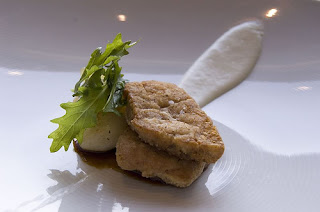Joslin Diabetes Center Part 2
Dietetic Internship, Diabetes Rotation
December 1-18, 2009
flickr photo Holiday Sugar Cubes by libraryman
I'm thinking of a classic line from Harper Lee's To Kill A Mockingbird, "You never really understand a person until you consider things from his point of view... Until you climb inside of his skin and walk around in it."
At Joslin many of the diabetes educators take this attitude. They try to experience the everyday life of a person with diabetes by tracking their own blood sugars, wearing a temporary
insulin pump (it has salt water, not real insulin!), or trying
continuous glucose monitoring. I must do likewise. This means I must learn to eat as if I had diabetes. My assignment this week:
carbohydrate counting.
What is diabetes?
Diabetes is a disease where the body cannot properly use and store energy. The primary form of energy is sugar, or glucose. Food is broken down into glucose and sent to the blood stream. The pancreas makes
insulin, which is a hormone that transports the glucose from the blood into body cells. In untreated diabetes, the glucose will constantly build up in the blood and cause serious complications. Insulin shots, oral medication, diet, and exercise are needed to manage diabetes. There is no cure.
There are two types of diabetes:
Type 1 Diabetes - The body cannot use glucose because the pancreas cannot make insulin.
Type 2 Diabetes- The body cannot use glucose because the pancreas makes too little insulin, or the insulin cannot efficiently transport the glucose into body cells.
What is carb counting?
Carbohydrate counting is a method of controlling food intake by tracking sugars. Carbohydrates are found in many foods, and once digested they immediately turn into glucose. Using menu plans and daily carbohydrate goals are helpful for dosing insulin and controlling blood sugars. A registered dietitian is the best professional to coach someone in carbohydrate counting.
For the record, this is not a "
diabetic diet." There's no such thing.
My Assignment:
- Pretend I have Type 1 Diabetes. I am taking 20 units of Lantus insulin at bedtime. (This slow-acting insulin is like a constant drip that steadies my blood sugar throughout the whole day). I am also taking Novolog at each meal. (This short-acting insulin quickly takes care of the food that I eat at mealtimes).
- Eat about 165 grams of carbohydrate each day.
- Only eat a max of 50 grams of fat each day.
- Eat small meals with frequent snacks. This helps stabalize the blood sugar.
- Try balance each meal with protein, carbohydrate, and fat. This gives slow and steady digestion of food, and evens out the blood sugars.
My Carb Counting Results for Monday, Dec 14th
I had to make a special shopping trip to Trader Joes this weekend, and I planned out my carbohydrate goals for each meal:
Breakfast 30 grams carbohydrates
Lunch 45 g
Snack 15 g
Dinner 60 g
Snack 15 g
Looks like I met my overall carbohydrate goal and my fat goal. However, my diet quality was low, and my meals were not spaced out very well. Balance could have been better, since I didn't have much protein.
The Carb List
Just for fun! This is what I'm frequently munching on during the week. Hmm, good to know. My carb awareness has increased.
Taken from food labels and Joslin's Food Choice List
What did I learn?
Lesson #1: 1-2-3, Re-learning the numbers. As suspected, counting was hard work. Besides the careful fat and carb tallies, carb counting was more than numbers. It required mindful eating, skillful label reading, and careful menu planning skills.
Lesson #2: Healthful eating is universal. Counting carbs is useful for managing diabetes. It's also useful for planning balanced meals. With or without diabetes, it's a skill for eating healthfully.
Lesson #3: I love my pancreas. Carb counting, tracking blood sugars, insulin shots, insulin pumps- these are all tools to imitate the action of the pancreas. But even with the best technology, diabetes management is not perfect. So I'm thankful for my pancreas; It really is an amazing organ. Good job pancreas, keep it up!
Carb counting is a tool, imperfect but useful. As one of my preceptors said, "Diabetes management is 60% art and 40% science. But shh...don't tell the doctors! They think it's the other way around." : )
















































